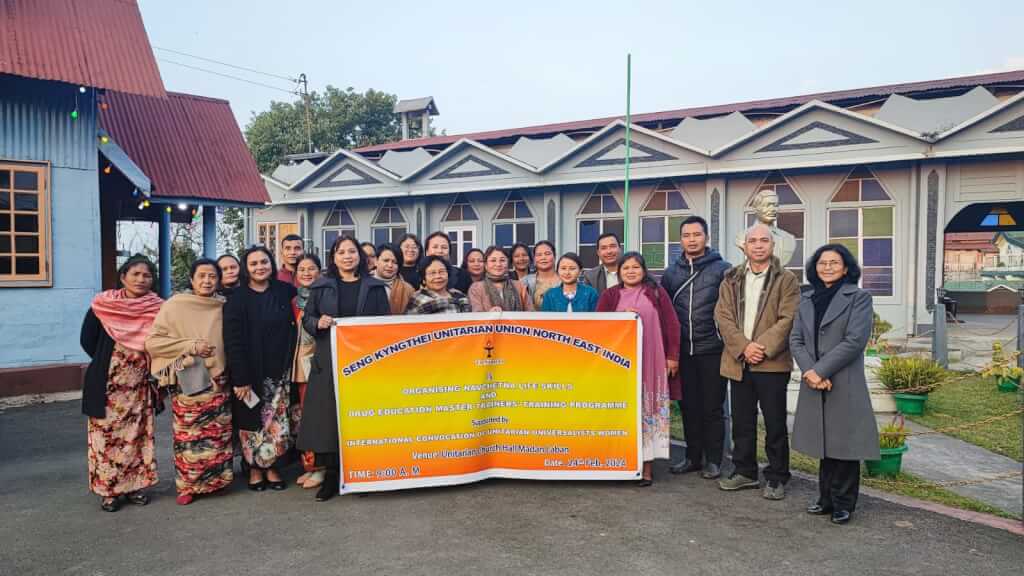ICUUW members contributed to a Faithify campaign to support drug education in the Khasi Hills. Navchetna, Hindi for “a new consciousness”, describes the aim of the program.
A Master Trainer’s Program was held at the Unitarian Church of Madan Laban in Shillong, Meghalaya, India on 24 February 2024. This Training program was conducted under the guidance of Dr. Rica Lamar and Mr. Anthony Syiemiong as Resource Persons. Nineteen participants, as well as members who were just listening in (Fishbowl observation), received training in conducting age-appropriate life skills and drug awareness programs for youngsters from 6th class/grade through 11th.
The program opened with Welcome words and Chalice Lighting by Kong Battinora Rani, Seng Kynthei President, Unitarian Union of Northeast India (UUNEI). A participant, Ms. Pynshisha Mylliemngap, offered prayers.
Mr. Anthony gave detailed information on drugs and alcohol and other addictive substances and the ever-increasing involvement of children from the age of 12 years onwards in alcohol, drugs and tobacco use. The incidence of peddling drugs in our state is also alarming.
The children affected range from spoilt rich kids to young laborers to poor street children. He informed us that the Government is increasing various awareness programs in schools and specially-trained people are needed to be the resource persons.
If we do not know how to approach this sensitive subject, it might lead to children trying these substances after the program, because children may want to try what was taught/mentioned, e.g. different types of substances and the mode of use.
Training included ways to recognize addicted children. For example: Look for mood swings, tiredness, emotional outbursts, changes in eating habits or friends, unexplained absence, memory loss, long personal care time e.g. in the toilet, presence of suspicious articles in their rooms like cotton, spoons, stocks of garbage bags, etc.
Children are influenced by new fashions, media, lifestyle, relevant others, including parents, friends and so on. Many children threaten suicide when family members try to intervene. This in turn leads to parents’ denial and the child’s addiction to substances. During these vulnerable age groups of 11 to 19 years, children tend to follow and imitate peers, friends and media. But at the same time they listen more to teachers than to their own parents.
During the program, different substances were identified, their effects were discussed scientifically and then ways to curb drug use were built.
The Awareness program is divided into two modules:
-
For 6th to 8th Standard (age 11-14)
-
For 9th to 11th Standard/Class (age 14-16).
Class 12 was not included due to Board Exams
Module-1
Live healthy and eat healthy- Good nutritious and healthy food, Balanced Diet, Importance of Healthy food, understanding good versus junk food, Personal hygiene. All were depicted in lively games, posters, Charts, Quiz form, slogan writing. The importance of serving the same type and amount of food to both growing girls and boys was explained.
Module-2
This is an age when children are already dealing with self-growth and development changes. Many times they feel awkward and confused. Many abuses are masked and hard to recognize especially those committed by people they trust and depend on.
In this module participants were taught prevention of child abuse, safe space (Recognizing good and bad touches).
The skills to use NICE and refuse or say ‘No’ firmly, using:-
N-No, I- Speak for oneself using ‘I’, C-Change the subject and E- Exit. Leave immediately.
In this module, the students are given ‘Situational stories’, examples that they have to discuss and find solutions that work when they are in danger of impending abuse. We were taught to observe and recognize if a child or student is going through abuse by various unusual behaviors and changed pattern in their lives, e.g. secretiveness, quietness, mood swings, self-harm, anger, fear, etc. These are ways a child could be asking for help or telling others, though without being direct due to fear of their perpetrators.
Managing Emotions- Understanding causes, effects, responses to various emotions. For example, Anger: various ways to take control and calm down.
Child Rights, Traits of trusted Adults, Peer pressure, Choosing friends wisely were also discussed.
Rehabilitation
The most important point in the steps towards rehabilitation is to be a friend and confidant to the child and never shame them.
-
Giving Support- Physical, mental and spiritual.
-
Building relationships with oneself, relatives, friends and others.
-
Continuous and gentle monitoring to prevent relapse.
-
Follow-up is very important.
The Training is very intense and interesting.
The Resource Persons have also sent these module Booklets so that Trainees can learn more details, study them, and make the various audiovisual aids. Trainees will be assessed while practicing among ourselves, and then there will be practice sessions in the field under observation by Guides before we are fit to venture on our own. We will need constant follow-up and practice. We need to invent ways to encourage children to approach us without fear of rejection.
It is a much needed program and we desperately need to make it work.
Last but not the least, I would like to thank the ICUUW, whose members have donated and supported us In many ways. I affirm that their efforts have been put toward a very good cause.
Thank you.
Elgiva Shullai
